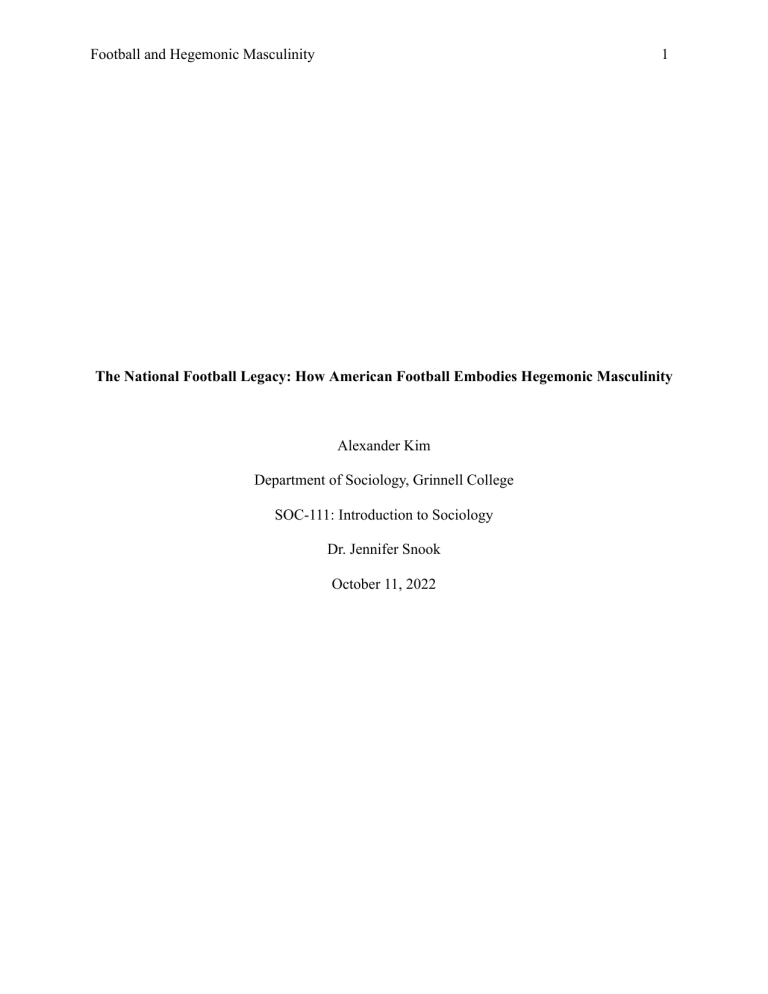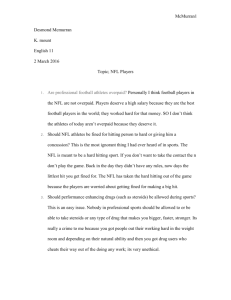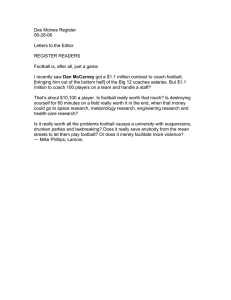
Football and Hegemonic Masculinity 1 The National Football Legacy: How American Football Embodies Hegemonic Masculinity Alexander Kim Department of Sociology, Grinnell College SOC-111: Introduction to Sociology Dr. Jennifer Snook October 11, 2022 Football and Hegemonic Masculinity 2 Abstract “Winning isn’t everything, it’s the only thing.” - Vince Lombardi Vince Lombardi is widely regarded as one of the greatest coaches in the history of the National Football League (NFL), if not the greatest, for his historic winning record and leadership abilities. His legacy in American football has been permanently enshrined through the naming of the Super Bowl trophy (the Vince Lombardi Trophy), which is the ultimate prize for any NFL team during a given season. However, as his quote on winning and the iconization of his legacy for his ability to win suggest, the game of football1 possesses an inherent nature of winning and, more importantly, dominating. Therefore, analysis of football, which is rife with examples of toxic formulations of masculinity and how to be a man, presents a lens in which one can examine the greater society in question. The desire for physical and mental domination intrinsic to football perfectly defines hegemonic masculinity, and a sociological examination of the culture of football further establishes how these men have been socialized to perform their gender in such violent manners. Keywords: Hegemony, Hegemonic, Masculinity, Patriarchy, Homophobia, Heterocentrism, Heterosexism, Sexuality, Gender as Performative 1 While football has a global connotation of “soccer,” here it exclusively refers to American football. Football and Hegemonic Masculinity 3 The National Football Legacy: How American Football Embodies Hegemonic Masculinity On October 10, 2022, in a divisional rivalry game between the Kansas City Chiefs and the Las Vegas Raiders, star wide receiver Davante Adams attempted to catch a pass from the edge of the sideline, just barely failing to maintain control of the ball before going out of bounds. The play, which would have put the Raiders in an advantageous field position and potentially won them the game, was overruled and the game ended up going in favor of the Chiefs by a single point. Adams, despite his stellar performance on the night, refused to partake in the typical sportsmanship gesture of greeting the opposing team in the middle of the field, instead heading towards his locker room. On the way, a frustrated Adams pushed an authorized cameraman on his left to the ground. Just an hour before, in the first half of the game, Troy Aikman, a Hall of Fame quarterback with three Super Bowl titles turned color commentator, reacted on primetime television to a highly controversial penalty call against the Chiefs, stating, “My hope is the competition committee looks at this in the next set of meetings and we take the dresses off” (Aikman). History Such events are commonplace in the NFL, where every member of the organization tries to emulate the expected machismo, which stems from the deep-seeded tradition of masculinity linked to football, dating back to the 19th century. In addition to the prevalence of war during the nascent ages of football and the similarity in ages of those who would be conscripted and those who played football, media coverage utilized, and continues to utilize, buzz words, where sportswriters would parallel the gridiron to the battlefield. Terms include “dropping bombs” for long passes, “blitz” - which comes directly from the German term “blitzcrieg” from World War Football and Hegemonic Masculinity 4 II, meaning highly concentrated bursts of force to break an opponent’s defenses - for utilizing extra players (concentrated bursts of force) to break an opponent’s offensive line (their defenses), and “trenches” for the area where offensive and defensive linemen tackle each other. The constant portrayal of football as a simulation of war, where pundits and journalists would glamorize the strategizing of opposing teams and the violence of the sport, provides the foundation for the hegemonic masculine undertones to the sport of football. Beginning with the labeling process of football jargon, the media’s conceptualization of football as an allegory for war created an image of the NFL: violent and parallel to the hegemonic, militaristic identity of the United States. Domination was and is the end goal of any successful football team, which directly contributes to the dominance that hegemony implies. The creation of this hegemonic identity for the NFL organization undoubtedly influenced individuals by constantly exposing them to NFL players: physically dominant men who often engaged in homophobic and promiscuous behavior. This form of socialization through media and entertainment contributes to a cycle of reinforcing toxic masculinity and upholding the performance of hyper-masculinity. The NFL continues to influence the behaviors of individuals across U.S. society, where football is the most viewed sport with more than 17.1 million weekly viewers in the United States alone. With a staggering five percent of all Americans consuming football on a weekly basis, the NFL has become ritualistic for many Americans. The traditions associated with football - alcohol and tailgates, parties often filled with barbeque and more alcohol - all reinforce this patriarchal American identity where football is a fundamental part of life for its representation of highly regarded “masculine” values and domination. Further, the behaviors that football provokes - debauchery, its accompanying raucousness, and violence - all provide credence to the amount of leeway society provides to men under the pretense of ideologies like Football and Hegemonic Masculinity 5 “boys will be boys,” which uphold the structural hierarchy of gender and allow men to retain their place at the top. Key Figures Adams and Aikman, two of the most recognizable names in football, further consolidate the modern existence of hegemonic masculinity and patriarchal conceptions within the NFL. As members of the NFL organization, both possess significant prestige and status. Adams, who boasts the eighth highest jersey sales across the NFL, is a modern-day superstar with a significantly likely presence in youth consumption of the NFL. The wide receiver position, arguably the most flashy and publicity-garnering besides quarterback, further adds to the popularity of Adams. Having children and fans of the sport consume portrayals of violence on and off the field, where Adams at one point slammed his helmet multiple times against a bench, certainly plays into the narrative that football and violence go hand-in-hand. Although Adams tweeted an apology shortly thereafter, he managed to place some of the blame on the cameraman, as well as the disingenuousness of a 280-character message in response to documented assault. While the NFL is currently discussing possible repercussions, these patriarchal conceptions of domination are fortified through explicit messaging - footage of Adam’s reaction to the game - and more implicit messaging - the tolerated behavior within the NFL. Harkening back to Lombardi, not only must football players dominate on the field, they must do it in all facets of life; if they exceed a certain threshold of acceptable behavior, their status as a football player provides certain levels of immunity. For impressionable viewers, both children and general sports consumers, these formulations of what a football player, a paragon of manhood, should be in relationship to violence instills certain beliefs of the NFL organization’s identity, as Football and Hegemonic Masculinity 6 well as subconsciously reinforcing and desensitizing people to what behavior qualifies as acceptable - a significant socializing mechanism. The primary connotation of Aikman’s comment, for the NFL’s bureaucratic heads to “take the dresses off,” is sexist, drawing on the gendering of fashion to misogynistically suggest that the competition committee’s perceived softness is feminine. Aikman is one of the most decorated NFL players of all-time, hailing from one of the largest markets in the NFL: the Dallas Cowboys. The prestige of his name, the large number of fans from his time in Dallas, and his place in the upper echelons of commentators, provide more gravity to the situation. Without any provocation, Aikman decided to make a sexist remark, which has led to dissent on social media and by traditional media. However, no players have commented against Aikman and others have even defended him, with one news source stating that the “PC mob [tried] to rip Aikman as a “misogynist”...over a nothing burger of a remark” (OutKick). The comments under the article referred to those negatively reacting to Aikman as “pansy’s,” “woke losers,” “Libtard,” and “pussies.” The deviant labeling of advocates for feminist principles proves that there are misogynistic norms that regulate people’s behaviors, especially in the world of football. Those attempting to counteract the patriarchal forces in society, especially in football, experience backlash from people who have been socialized to perform their gender in ways deemed masculine by the people and structures around them (West and Zimmerman, 1987). This includes feminizing labels, which leads to emasculation, and disregard through culture, where attempting to resist the social order means you become labeled as deviant through other indicators, such as political ideology, hence “Libtard.” The lack of a response by the NFL and its members indicates that the issue is not deemed worthy of repercussions and that such behavior falls within the window of acceptable behavior, Football and Hegemonic Masculinity 7 reinforcing misogynistic conceptions. As spectators witness this unfold, watching their favorite players and personalities get away with behaviors that embody hegemonic masculinity reinforces existing social messages that attempt to maintain the patriarchal order that our society perpetuates. Homophobia There is currently only one openly gay NFL player of 1696 actively-rostered players: Carl Nassib. Despite more than 23,000 men having participated in the NFL, only 16 players have come out as gay, with everyone but Nassib coming out well after their careers had ended. However, the reason for qualifying NFL players with their presence on an active roster relates to the unfortunate story of Michael Sam, a member of the 2014 draft class. In celebration of his selection, he kissed his boyfriend on national television. After being drafted, he participated on the Cowboys practice squad before being cut without ever playing a snap in a professional football game. Despite teams refuting allegations of the video influencing his eventual dismissal, for the NFL and its fanbase, which has a long history of upholding forms of hegemonic masculinity through the perpetuation of toxic masculinity and heterocentrist views, there is undeniably a correlation between the two events. When the NFL released a tweet in response to Nassib coming out, the comments section was flooded with reactions embodying the message of one user: “football is for men” (Twitter). Even though gay men are men, the heterocentric view of masculinity demarcates gender within the additional confines of sexual orientation. A true man is heterosexual. And football is for those men, the heterosexual men. This further adds to the deviance of people outside the dominant group: heterosexual men. Football and Hegemonic Masculinity 8 Even though Nassib was openly received by the media, only a handful of players congratulated him for his bravery. He placed his career on the line and, for the deeply rooted homophobia that has been socialized into the players, as men, he did not receive the support he deserved. While gender and sexuality are distinct, people conflate the two in order to further perpetuate existing power hierarchies. Gender is the classification of self-expression and personal identification and sexuality is the classification of sexual attraction. However, because of the ways in which the dominant groups - those who uphold gender binaries, male/female, and heterosexism - influence the socialization of others, gender often influences the specific label of a person’s sexuality dependent on their gender identity and the gender identities of those they are attracted to. Similar to Gagnon and Simon’s “sexual scripts,” where social and cultural blueprints dictate how we create and express the experience of the deeply personal and intimate, there are scripts for gender, where our actions are perceived through blueprints dictating how our behaviors embody certain labels (Kimmel, 62). While much of the information about players’ reactions is speculative due to their silence, their silence is loud and suggestive of the social forces inhibiting support for Nassib’s bravery. One can only hope that the future of the NFL is one of more inclusivity and understanding. However, there is much to be done as the socialized behaviors and structural forces at play run deep. Football and Hegemonic Masculinity 9 References AMMER, C. (2011, November 8). Fighting Words: Military Terms That Apply to Sports. HistoryNet. Retrieved October 11, 2022, from https://www.historynet.com/fighting-words-military-terms-that-apply-to-sports/ Antoniacci, M. (2016, September 8). 28 of the Greatest Quotes From NFL Legends. Inc. Magazine. Retrieved October 11, 2022, from https://www.inc.com/mandy-antoniacci/28-of-the-greatest-quotes-from-nfl-legends.html Avila, A. (2022, October 11). PC Mob Attacks ESPN's Troy Aikman For Monday Night Football Comment. OutKick. Retrieved October 11, 2022, from https://www.outkick.com/pc-mob-goes-after-troy-aikman-for-saying-nfl-players-need-to-t ake-dresses-off/ Buller, A. (2022, October 8). Top-selling NFL jerseys: Josh Allen and Kenny Pickett have league's most popular jerseys among football fans in 2022. Sportsnaut. Retrieved October 11, 2022, from https://sportsnaut.com/top-selling-nfl-jerseys/ Football and Masculinity in the 19th Century · Covered With Glory: Football at UGA, 1892-1917. (2017, August 31). UGA Libraries. Retrieved October 11, 2022, from https://digilab.libs.uga.edu/scl/exhibits/show/covered_with_glory/football_masculinity Gould, A. (2022, October 11). NFL World Reacts To Troy Aikman's Controversial Comment. The Spun. Retrieved October 11, 2022, from https://thespun.com/nfl/nfl-world-reacts-to-troy-aikmans-controversial-comment Gutierrez, P. (2022, October 11). Raiders' Davante Adams pushes person postgame, apologizes. ESPN. Retrieved October 11, 2022, from Football and Hegemonic Masculinity 10 https://www.espn.com/nfl/story/_/id/34772685/raiders-davante-adams-pushes-person-pos tgame-apologizes Jossell, S. (2021, June 30). The NFL Can't Just Say “Football Is Gay” While Ignoring Its Own Homophobia and Racism. Them. Retrieved October 11, 2022, from https://www.them.us/story/nfl-football-is-gay-league-homophobia-racism-op-ed-carl-nass ib Kimmel, M. S., & Plante, R. F. (2007, Spring). Sexualities. Contexts, 6(2), 63-65. 10.1525/ctx.2007.6.2.63 NFL. (2021, June 28). Football is For All. Twitter. Retrieved October 11, 2022, from https://twitter.com/NFL/status/1409527004899201042?ref_src=twsrc%5Etfw%7Ctwcam p%5Etweetembed%7Ctwterm%5E1409527004899201042%7Ctwgr%5E%7Ctwcon%5E s1_&ref_url=https%3A%2F%2Fwww.them.us%2Fstory%2Fnfl-football-is-gay-league-h omophobia-racism-op-ed-carl-nassib NFL Media. (n.d.). 2021 NFL Regular Season Averaged 17.1 Million Viewers. NFL Communications. Retrieved October 11, 2022, from https://nflcommunications.com/Pages/2021-NFL-Regular-Season-Averaged-17.1-Million -Viewers.aspx


